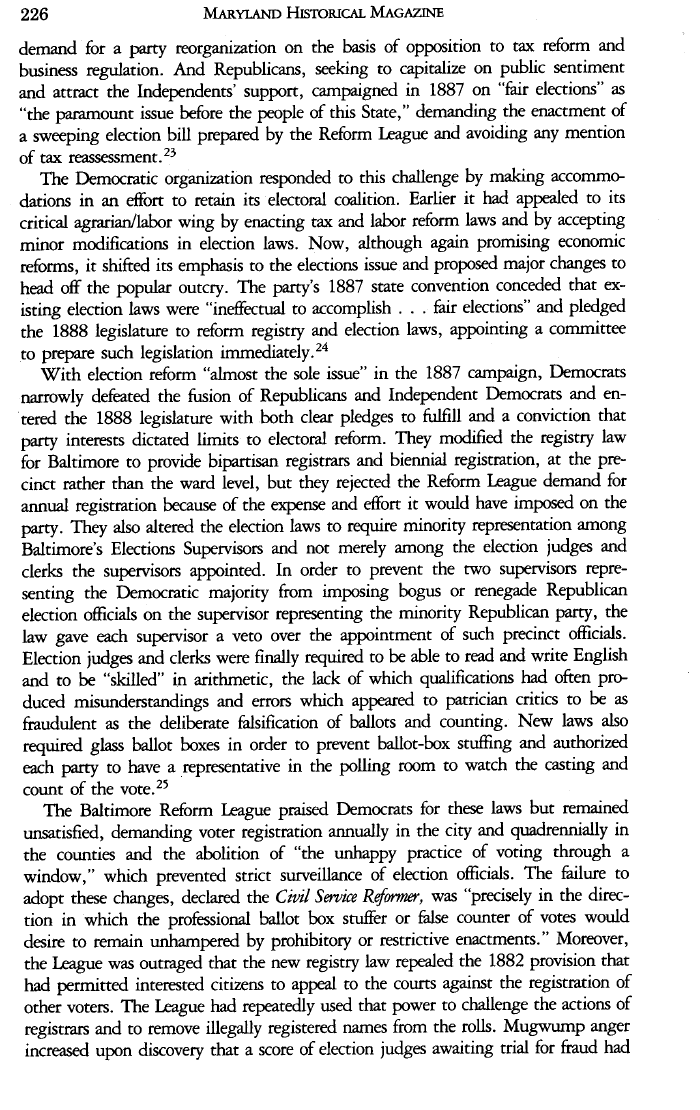|
226 MARYLAND HISTORICAL MAGAZINE
demand for a party reorganization on the basis of opposition to tax reform
and
business regulation. And Republicans, seeking to capitalize on public
sentiment
and attract the Independents' support, campaigned in 1887 on "fair
elections" as
"the paramount issue before the people of this State," demanding the
enactment of
a sweeping election bill prepared by the Reform League and avoiding any
mention
of tax reassessment.23
The Democratic organization responded to this challenge by making accommo-
dations in an effort to retain its electoral coalition. Earlier it had
appealed to its
critical agrarian/labor wing by enacting tax and labor reform laws and by
accepting
minor modifications in election laws. Now, although again promising economic
reforms, it shifted its emphasis to the elections issue and proposed major
changes to
head off the popular outcry. The party's 1887 state convention conceded
that ex-
isting election laws were "ineffectual to accomplish . . . fair elections"
and pledged
the 1888 legislature to reform registry and election laws, appointing a
committee
to prepare such legislation immediately. 24
With election reform "almost the sole issue" in the 1887 campaign, Democrats
narrowly defeated the fusion of Republicans and Independent Democrats and
en-
tered the 1888 legislature with both clear pledges to fulfill and a
conviction that
party interests dictated limits to electoral reform. They modified the
registry law
for Baltimore to provide bipartisan registrars and biennial registration,
at the pre-
cinct rather than the ward level, but they rejected the Reform League
demand for
annual registration because of the expense and effort it would have imposed
on the
party. They also altered the election laws to require minority
representation among
Baltimore's Elections Supervisors and not merely among the election judges
and
clerks the supervisors appointed. In order to prevent the two supervisors
repre-
senting the Democratic majority from imposing bogus or renegade Republican
election officials on the supervisor representing the minority Republican
party, the
law gave each supervisor a veto over the appointment of such precinct
officials.
Election judges and clerks were finally required to be able to read and
write English
and to be "skilled" in arithmetic, the lack of which qualifications had
often pro-
duced misunderstandings and errors which appeared to patrician critics to
be as
fraudulent as the deliberate falsification of ballots and counting. New
laws also
required glass ballot boxes in order to prevent ballot-box stuffing and
authorized
each party to have a .representative in the polling room to watch the
casting and
count of the vote .2s
The Baltimore Reform League praised Democrats for these laws but remained
unsatisfied, demanding voter registration annually in the city and
quadrennially in
the counties and the abolition of "the unhappy practice of voting through a
window," which prevented strict surveillance of election officials. The
failure to
adopt these changes, declared the Civil Service Reformer, was "precisely in
the direc-
tion in which the professional ballot box stuffer or false counter of votes
would
desire to remain unhampered by prohibitory or restrictive enactments."
Moreover,
the League was outraged that the new registry law repealed the 1882
provision that
had permitted interested citizens to appeal to the courts against the
registration of
other voters. The League had repeatedly used that power to challenge the
actions of
registrars and to remove illegally registered names from the rolls. Mugwump
anger
increased upon discovery that a score of election judges awaiting trial for
fraud had
|

